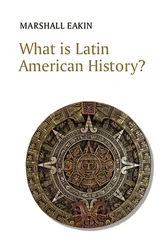Inspired by the success of the settlement of Plymouth (and overlooking the hardships involved in it), another group of Puritans—these only somewhat less radical than the Pilgrims—landed at Massachusetts Bay in five ships in 1630. Eleven more ships arrived the next year. Under the auspices of the Massachusetts Bay Company, a joint stock trading organization chartered by the English crown in 1629, 20,000 immigrants, mostly Puritans, would arrive by 1642, authorized to colonize a vast area extending from three miles north of the Merrimack River to three miles south of the Charles River. Led by John Winthrop, the new Massachusetts Bay Colony was centered in a city called Boston, and it soon prospered.
The Puritans wanted to create in the New World a new center of right religion, to build what their sermons (with reference to the Old Testament) frequently called a “city on the hill”—a place of holiness that would be an example for all humankind. Toward this end, the Puritans laid great emphasis on family life and, in particular, on the education of children as well as the education of a class of clergymen sufficiently learned to interpret the Scriptures as authentically as possible. For the Puritans intended to guide their actions by an intensive interpretation of the Bible, since they saw themselves as living out a kind of Biblical allegory and prophecy in which they were on an “errand into the wilderness,” chosen by God to build the “New Jerusalem.” The most immediate practical effects of these beliefs were the creation of Boston’s High and Latin Schools as early as 1635, and Harvard College the very next year. Moreover, the Puritan character rapidly evolved into an unlikely combination of a limitless appetite for brilliant religious disputation and flinty intolerance of nonconforming beliefs. Needless to say, although they were smart folks, you wouldn’t want to spend a cocktail evening with one.
Rhode Island: Haven for the Heterodox
One of the most brilliant masters of religious disputation was the Reverend Roger Williams (ca. 1603-1683), who immigrated from England to Boston in 1631. He declined an offer to become minister of the first Boston congregation because it had not formally separated from the Anglican Church. Instead, Williams moved first to Salem, then to Plymouth, and back to Salem. In each place, he was criticized for his “strange opinions,” which included a conviction that the lands chartered to Massachusetts and Plymouth belonged by right to the Indians, that a civil government could not enforce religious laws, and that religion itself ultimately rested on profoundly individual conscience and perception. Ordered by the Puritan hierarchy to change his views, Williams refused and was finally expelled from the colony by the Massachusetts General Court in October 1635. He and a handful of followers found refuge in January 1636 among the Indians on Narragansett Bay. At the head of that bay, Williams purchased from his protectors a small tract and founded a town he called Providence-the first settlement in Rhode Island.
During the next four decades, Williams welcomed to Rhode Island those of all persuasions. In 1644, during the English Civil War, he secured a patent for the colony from the Puritan-controlled Parliament, and he established a genuinely representative government founded on the principle of religious freedom. Williams returned to England again, where he successfully defended his colony’s grant against the onslaught of Puritan objections, and after the restoration of Charles II to the British throne, he secured a royal charter in 1663, sanctioning the liberal institutions he had created.
Maryland: Catholics Welcome
The founding and survival of heterodox Rhode Island made it clear to the Puritans that their “city on a hill” would not stand alone in America. In yet another colony, the interests of a group even more repugnant to the Puritans were taking root.
In 1632, King Charles I of England, under siege from the Puritan faction that would soon overthrow him, granted the Roman Catholic George Calvert, First Baron Baltimore a charter to settle North American lands between the 40th parallel and the south bank of the Potomac. The First Baron Baltimore died before the papers were executed, and the charter passed to his son Cecil Calvert, Second Baron Baltimore. In November 1633, 200 Catholic colonists set sail from England in the Ark and the Dove, which landed on March 24, 1634, on an island at the mouth of the Potomac they named Saint Clement (it is now called Blakistone Island). The colonists purchased the Indian village of Yaocomico and called it St. Mary’s (it is present-day St. Mary’s City), which served for the next 60 years as the capital of the colony. Under Lord Baltimore’s direction, in 1649, the Colonial Assembly passed the Act Concerning Religion, the first law in the American colonies that explicitly provided for freedom of worship-although it applied only to Christians.
Pennsylvania: Quaker Colony
Freedom of worship was the theme for the creation of yet another non-Puritan colony. The Society of Friends—commonly called Quakers—was founded in 17th-century England by a visionary leader named George Fox. His belief was in the immediacy of Christ’s teaching; that is, divine guidance was not “mediated” by Scripture, ceremony, ritual, or clergy, but came ultimately to each individual from an “inward light.” Accordingly, worship meetings were held in silence, unless some members of the meeting were “moved” or “inspired” to speak. No minister officiated.
By its nature, Quakerism is subversive of authority imposed from the outside, and although a prime tenet of Quakerism is nonviolence and supreme tolerance of all points of view, the religion was quickly perceived as a threat to the dominant order. Quakers were officially and unofficially persecuted. Some immigrated to America, settling in the Middle Atlantic region as well as North Carolina. An early enclave was established in Rhode Island.
The Quakers did have some powerful adherents, one of whom was William Penn, the brilliant young son of a prominent British admiral. On March 14, 1681, Penn obtained from King Charles II a charter granting him proprietorship of the area now encompassed by Pennsylvania. In 1682, Delaware was added to the charter. The region was occupied by some 15,000 Delaware, Shawnee, and Susquehanna Indians, as well as tribes associated with the Iroquois League. During the 17th century, it was claimed by Dutch, Swedish, and English interests. Penn landed at the site of present-day New Castle, Delaware, and performed “livery of seisin,” legally taking possession of his grant by pulling up a tuft of grassy turf in his hand. In 1682, he founded Philadelphia, a name Penn formed from two Greek words signifying “brotherly love.” The name expressed the intent of what Penn planned as a “holy experiment” of living in harmony.
Under Penn, “The Great Law of Pennsylvania” extended male suffrage to those who professed a belief in God and met modest property requirements; imprisonment for debt—one of the great scourges of life in England-was all but eliminated; and the death penalty, liberally applied in the Mother Country, was restricted to cases of treason and murder. In a combination of the best tradition of English common law and a dramatic foreshadow of the United States Bill of Rights, the Great Law specified that no person could be deprived of life, liberty, or “estate” (property) except by due, fair, and impartial trial before a jury of 12.
Georgia: Utopia and Prison
Founded on firm—though diverse—religious principles, Plymouth, the Massachusetts Bay Colony, Rhode Island, Maryland, and Pennsylvania were all expressions of hope, variations on a theme of desire for a better life. The origin of Georgia was even more frankly utopian.
Читать дальше












